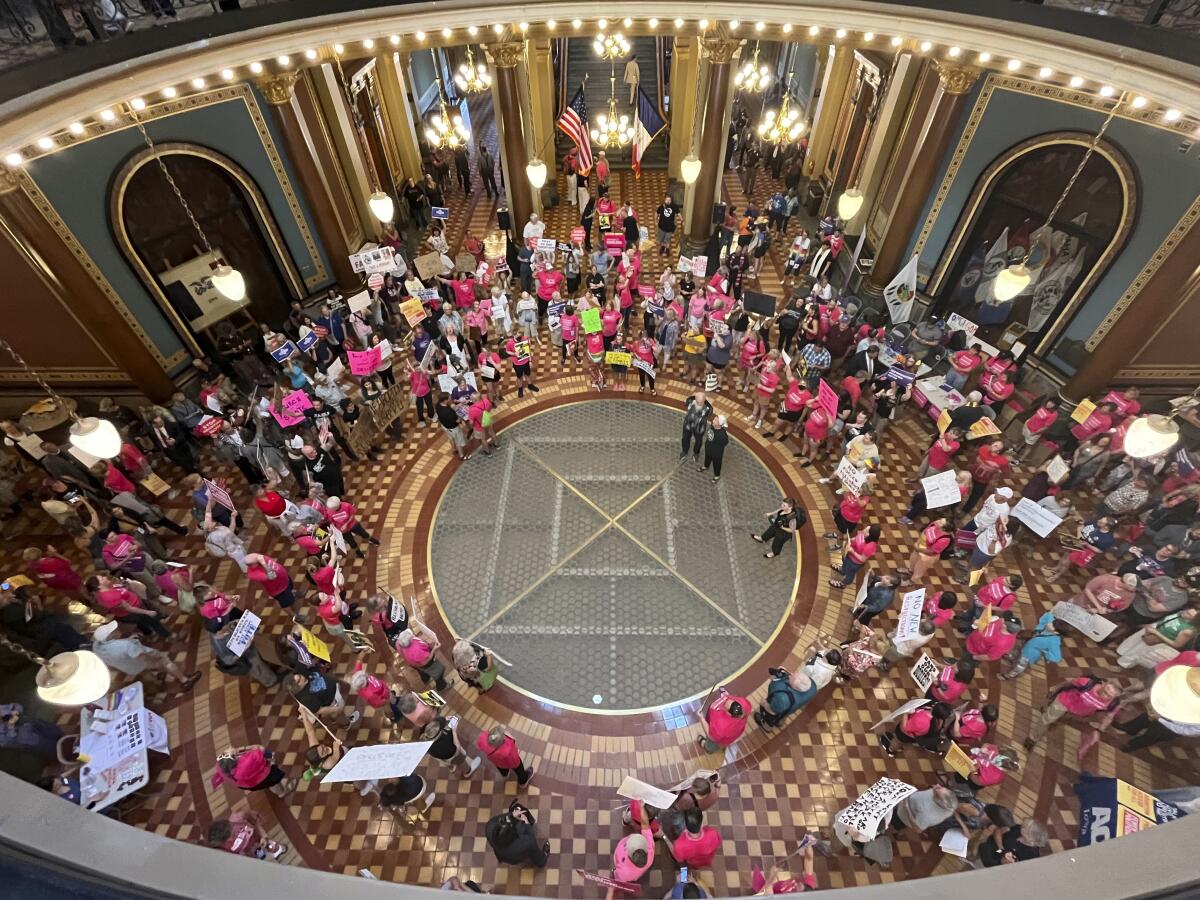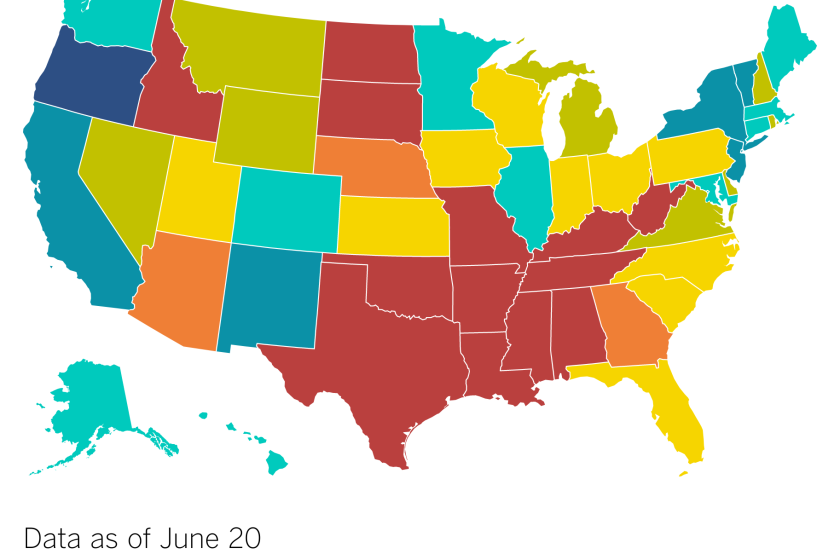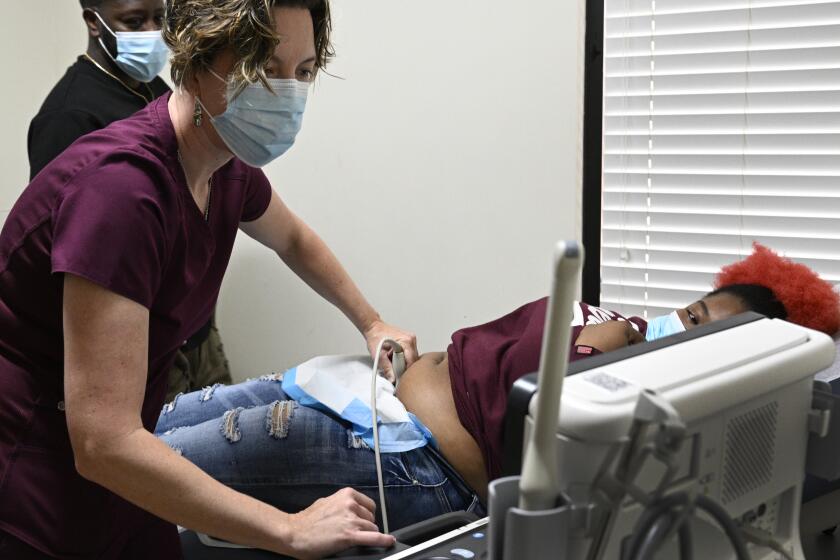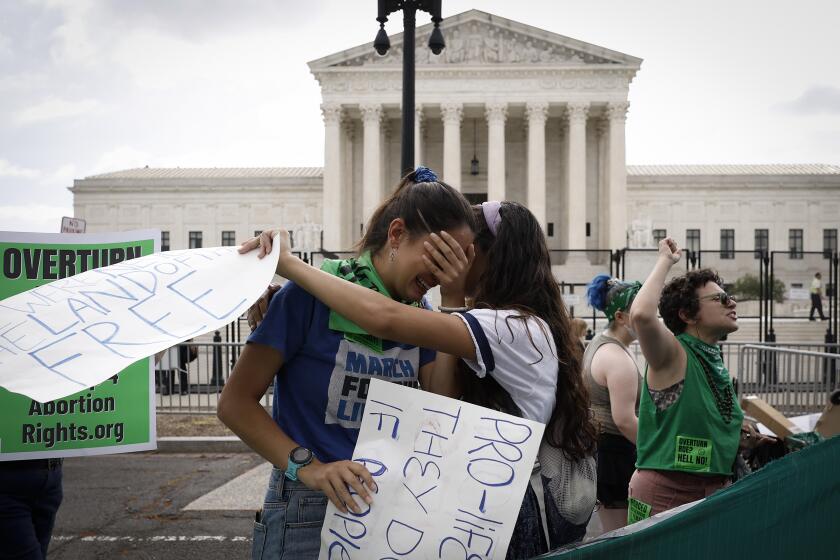Iowa law banning most abortions after about 6 weeks takes effect as judge weighs whether to block it

DES MOINES — Iowa’s ban on most abortions after about six weeks of pregnancy was signed into law Friday by Gov. Kim Reynolds, but a judge is still considering abortion advocates’ request to put the restrictions on hold.
The new legislation prohibits almost all abortions once cardiac activity can be detected, which is usually around six weeks of pregnancy and before many women know they are pregnant. That’s a dramatic shift for women in Iowa, where abortion had been legal up to 20 weeks of pregnancy.
Reynolds signed the measure into law in front of 2,000 conservative Christians, barely a mile away from where a court hearing for the request to postpone the state’s new ban took place. The ACLU of Iowa, Planned Parenthood North Central States and the Emma Goldman Clinic filed the legal challenge Wednesday and representatives spoke at the court hearing Friday.
That hearing ended with the judge saying a decision on whether to put a hold on the new ban may be made next week.
A year after the Supreme Court overturned Roe vs. Wade, leaving abortion decisions to states, where is abortion banned or protected? What comes next?
District Judge Joseph Seidlin said he could not imagine “anything that would be more insulting to either side” than for him to “flippantly” rule from the bench Friday.
The split screen punctuates a bitter battle between abortion advocates and opponents in Iowa that has dragged on for years and will likely, for now, remain unresolved as the courts assess the law’s constitutionality.
“As we gather here today, at this very moment, the abortion industry is in the court trying to prevent this law from taking effect and stop once again the will of the people,” Reynolds said before bringing people on the stage to sign the law. “But the passage of this legislation by even a wider margin this times sends an unmistakable message.”
The bill passed with exclusively Republican support late Tuesday at the conclusion of a rare, 14-hour special legislative session.
The new measure will be considered in the context of decisions by the U.S. Supreme Court and Iowa’s Supreme Court last year, when both reversed themselves on rulings that had affirmed a woman’s fundamental constitutional right to abortion.
A former abortion clinic in Alabama evolves amid bans on caring for uninsured patients and offering post-miscarriage treatment and transgender care.
Those decisions prompted Reynolds to ask the court to reinstate her blocked 2018 law, which is nearly identical to the new one. The state’s high court deadlocked last month, prompting Reynolds to call lawmakers back to the Iowa Capitol.
“Patients’ lives are deeply impacted every day that this law is allowed to stand,” said Ruth Richardson, president and CEO of Planned Parenthood North Central States. “Iowans will be harmed as they’ve lost the right to control their bodies and futures. Iowans must have the freedom to make the best medical decisions for themselves and their families. We stand at the ready for our patients as we await the Court’s decision and are prepared to help them get the reproductive health care they need regardless of the outcome.”
Planned Parenthood North Central States was planning to refer patients to other states, but remained hopeful there would not be a long interruption in services. As of Wednesday, 200 patients were scheduled for abortions at Iowa Planned Parenthood or the Emma Goldman Clinic this week and next, according to the court filings. Most of them are past the six-week mark in their pregnancies.
Activists in Poland say there are ways to work around even draconian anti-abortion measures. But there’s plenty to fear, they say.
One Planned Parenthood clinic stayed open until about 9:30 p.m. Thursday in an effort to provide abortion care before the new restrictions, the clinics’ attorney said.
“I can only hope that all patients who had appointments this morning have gotten the care that they need and that they’re not sitting at a health center right now,” the clinics’ attorney Peter Im said during Friday’s court arguments.
Iowa lawmakers passed the law in less time “than the 24-hour time period that’s required for patients to wait before they get an abortion in Iowa,” he said, adding that the status quo for the last 50 years has been for abortion pre-viability to be legal in Iowa.
“This law, which on Tuesday the General Assembly passed in the dead of night after less than a day of deliberation, will violate Iowans’ constitutional rights and alter that status quo and have devastating consequences for Iowans,” he said.
In a historic reversal, the Supreme Court strikes down a half-century of nationwide abortion rights in the U.S.
There are limited circumstances under the measure that would allow for abortion after the point in a pregnancy where cardiac activity is detected: rape, if reported to law enforcement or a health provider within 45 days; incest, if reported within 145 days; if the fetus has a fetal abnormality “incompatible with life”; or if the pregnancy is endangering the life of the pregnant woman.
Most Republican-led states have drastically limited abortion access in the year since the U.S. Supreme Court overturned Roe vs. Wade and handed authority on abortion law to the states. More than a dozen states have bans with limited exceptions and one state, Georgia, bans abortion after cardiac activity is detected. Several other states have similar restrictions that are on hold pending court rulings.
White House Press Secretary Karine Jean-Pierre put out an immediate statement saying Iowa’s newly signed law is “an extreme abortion ban that will take away a woman’s right to choose.”
“While Republican elected officials advance dangerous laws, President Biden and Vice President Harris stand with the majority of Americans who believe personal health care decisions should be between a woman and her doctor, not politicians, and will continue to call on Congress to codify the protections of Roe v. Wade in federal law,” the statement said.
More to Read
Sign up for Essential California
The most important California stories and recommendations in your inbox every morning.
You may occasionally receive promotional content from the Los Angeles Times.














